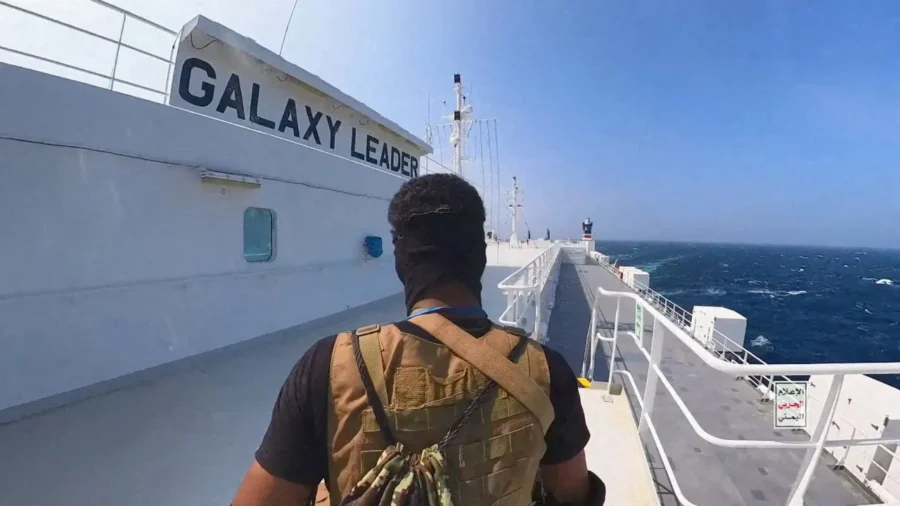U.S. President Joe Biden recently launched a new maritime force, hoping for a firm response from U.S. allies to Yemen’s Houthi attacks on Red Sea shipping. However, the launch did not have the desired effect, as many allies refused to be associated with it.
Just a week after Operation Prosperity Guardian was launched, two of America’s European allies—Italy and Spain—both of whom were listed as contributors, issued statements indicating a shift in support for the maritime force.
According to the Pentagon, the force comprises a defensive coalition of more than 20 nations. Its purpose is to ensure commerce worth billions of dollars is able to navigate freely through a vital shipping passage at the Red Sea’s southern tip, off the Yemeni coast.
So far, close to half of the allied countries have declined to acknowledge contributions, directly or indirectly via the United States. Contributions can entail anything from sending staff officers to sending warships.
Reasons for Reluctance
The allies’ reluctance to offer contributions appears to predominantly be due to the international rift caused by the Gaza conflict. The Biden administration is holding firm to its support for Israel, while many allied nations retracted over international criticism of Israel.
“European governments are very worried that part of their potential electorate will turn against them,” according to David Hernandez, a professor of international relations at the Complutense University of Madrid.
Mr. Hernandez added that European skepticism of Israel’s engagement in Gaza is growing, sparking concerns that the nations could be drawn further into the conflict.
Around a dozen ships have been attacked or seized by Iran-backed Houthis with missiles and drones since Nov. 19, effectively aimed at stifling Israel’s retaliation for the Oct. 7 massacre, which killed over 1,200 people and saw more than 240 hostages taken by the Hamas terrorist group.
The navies of the United States, Britain, and France have each shot down Houthi-launched drones or missiles.
The Red Sea is a vital shipping route and entry point for ships using the Suez Canal. The route handles roughly 12 percent of global trade, vital for the movement of goods between Asia and Europe.
The recent Houthi attacks have caused significant problems, resulting in some ships being rerouted around Africa’s Cape of Good Hope, which has a substantial effect on sailing time and costs.
Although Denmark’s container giant Maersk stated on Dec. 23 that it would resume shipping operations in the Red Sea and the Gulf of Aden, Germany’s Hapag Lloyd remains cautious.
The company announced on Dec. 27 that it will continue to send ships around the Cape of Good Hope, citing fears the Red Sea route remains too dangerous.
Allied Response
Of the 20 countries that signed up for the maritime task force, the United States has announced the names of only 12.
“We’ll allow other countries, defer to them to talk about their participation,” U.S. Major General Patrick Ryder told reporters last week.
The EU has indicated it supports the maritime task force, alongside a joint statement condemning the Houthi attacks.
Meanwhile, Britain, Greece, and others have shown public support for the U.S. operation, despite some of them stopping short of confirming direct involvement, following the U.S. announcement.
Italy’s defense ministry said that it would send a ship to the Red Sea following requests from Italian ship owners, yet separate from the U.S. operation.
France has confirmed that while it is supportive of efforts to secure freedom of navigation in the region, its ships would remain under French command.
Spain has openly refused to join Operation Prosperity Guardian and expressed opposition to using an existing EU anti-piracy mission, Atalanta, to protect Red Sea shipping, however, it indicated it was willing to explore alternatives, according to a statement by Prime Minister Pedro Sanchez on Dec. 27.
Both Saudi Arabia and the United Arab Emirates declined to participate in the venture.
Possible Backlash
Moreover, in addition to concerns over losing public support, some countries fear possible backlash from Houthi terrorists, which likely plays an instrumental role in their decision to refrain from joining the U.S. operation.
According to an Indian government official, India is unlikely to join the U.S. operation over fears that the country’s alignment with the United States could make it a potential target.
International Support
Nonetheless, many European and Gulf countries already participate in one of several U.S.-led military groups in the Middle East, including the 39-nation Combined Maritime Forces (CMF).
The EU’s Atalanta operation already cooperates in a “reciprocal relationship” with CMF, according to a spokesperson for the group, indicating that some countries not formally joining the Red Sea maritime task force could still coordinate patrols with the U.S. Navy.
There is a deeper incentive underlying the U.S. effort for international support in the Red Sea. Many of Iran’s military proxies in the region have exerted pressure on the United States, with additional attacks on U.S. troops in Syria and Iraq.
So far, the United States has carried out limited retaliatory air strikes against Iraqi and Syrian terrorist groups but has refrained from doing the same in Yemen.
According to Michael Mulroy, a former deputy assistant secretary of defense for the Middle East under the Trump administration, the new U.S. operation appears to serve the purpose of isolating any future Houthi attacks from Israel’s war with Hamas, by making the attacks an international issue.
“Once the military vessels in Operation Prosperity Guardian start protecting commercial shipping and come under a direct attack, [the Houthis] will be attacking the coalition, not just the U.S.,” Mr. Mulroy said.
Reuters contributed to this report.


